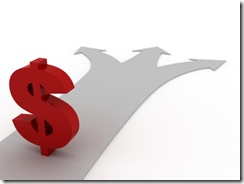
I am someone that has refinanced my house twice, so I know the ins and outs of refinancing as a consumer. In some situations I believe it is a good idea to refinance, and in other situations I believe that it is not a good idea. My personal rule is that there really are no hard and fast rules – you just really need to evaluate if it is the correct decision for you.
Consider refinancing if…..
If at least one of the following applies, I would tend to say “yes” to the refinance…
1. If you are switching from an ARM to a fixed rate
Absolutely do it! An Adjustable Rate Mortgage will hurt you in the end. The amount can go up to double of what you are paying now. Refinance to a fixed rate as soon as you humanly can!
2. If you need a large sum of money for a major house improvement
Homes need repairs. Roofs need replaced. If it is a major improvement that is necessary, or will be necessary in the next few years, then refinancing will have the least impact. Notice I said “major” – such as a roof. I do not recommend it for improvements that are less than $10,000.
3. The interest rate is at least one full point lower than the current rate.
Make sure that the refinance will be a full point lower on the day of signing. Remember that rates often fluctuate. One point can be significant enough to counteract all of the “back end” fees such as the added principle.
4. The current payment is too high for your income.
The old interest rate has a payment that is too high due to a job change, or another factor, refinancing is probably the best route.
Do not refinance if….
If one or the following applies, I would tend to say “no” the refinance…
1. Never refinance to buy a vehicle or to get cash.
It may sound appealing, but if you think about it, you are refinancing a car for the same time that you are financing your house. So if you refinanced for 30 years, it will essentially take you 30 years to pay off that vehicle. By that time, the car will probably be in a scrap yard.
2. Never refinance to get rid of credit card debt.
If you refinance to get rid of credit card debt, because that debt will then be tied to your house. If you cannot pay your credit card debt, it is unlikely that you will lose your house or car because of it. If you cannot pay the mortgage you lose your house. Do not put the two together.
It is important to remember that a refinance is essentially like starting over. Sometimes “starting over,” means that you will pay tens of thousands less in the long run. But also remember that “starting over” with refinancing means that you are starting over with more than you paid to begin with. Weigh the options and decide what is right for you.
Make sure to have a strong savings account for emergencies. It remains one of the strongest investments.
